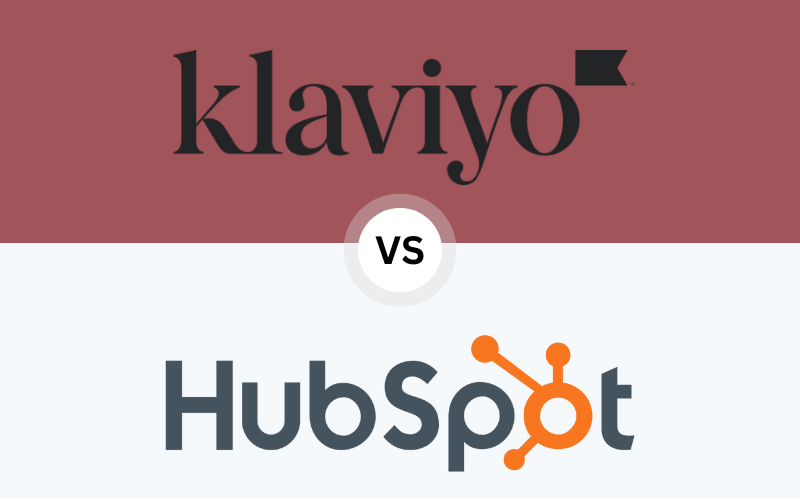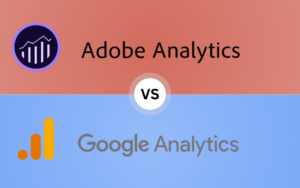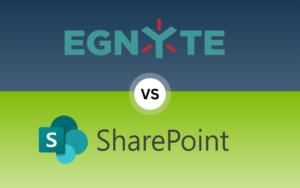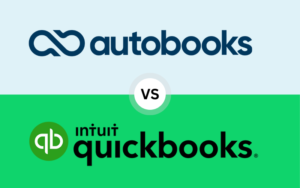“Klaviyo vs HubSpot in 2024. Which CRM and email marketing tool is best for your business? Discover the platform suited for startups, growing businesses, and fully operational companies in this comprehensive guide.“
TL;DR: Klaviyo vs HubSpot
Don’t have time to read the entire article? Here’s a quick summary:
- For startups: Klaviyo is an excellent choice for businesses focused on email marketing, especially in the eCommerce space. Its affordability and automation tools make it perfect for businesses just starting out and aiming for quick growth.
- For growing businesses: HubSpot is better suited for companies scaling up. Its all-in-one CRM, marketing automation, and customer service tools allow growing businesses to manage multiple teams and processes in one unified system.
- For fully operational enterprises: HubSpot shines due to its scalability, advanced CRM tools, and seamless integration of sales, marketing, and service operations. Klaviyo remains an email marketing powerhouse but may not offer the CRM depth enterprises need.
- Key Differences: Klaviyo is highly focused on eCommerce and email marketing, while HubSpot offers a more comprehensive suite that includes CRM, marketing, sales, and customer service tools.
- 3 Alternatives: ActiveCampaign, Mailchimp, and Salesforce offer competitive alternatives depending on your business needs.
Table of Contents
Klaviyo vs HubSpot – A 2024 Comparison
In 2024, businesses of all sizes face the challenge of managing customer relationships while growing revenue through targeted marketing. Klaviyo and HubSpot have established themselves as industry leaders, but they serve different niches within the CRM and marketing automation space.
Klaviyo is renowned for its data-driven email marketing capabilities, especially for eCommerce businesses that thrive on personalized customer interactions. HubSpot, on the other hand, provides a comprehensive CRM that integrates marketing, sales, and customer service in one platform, making it the go-to choice for businesses looking for an all-in-one solution.
In this guide, we’ll take a deep dive into Klaviyo vs HubSpot, explore their strengths and weaknesses, and help you determine which platform is the best fit for your business—whether you’re just starting, scaling, or fully operational.

Why CRM and Email Marketing Are Essential in 2024
In an increasingly digital world, customers expect personalized, timely communication. That’s why businesses need a CRM (Customer Relationship Management) system that tracks customer interactions, manages data, and enables personalized marketing strategies.
Email marketing remains one of the most effective channels for businesses to engage with customers, driving conversions and boosting loyalty. A strong CRM combined with targeted email marketing can help businesses nurture relationships, convert leads into customers, and retain existing clients.
The Role of Klaviyo
Klaviyo is designed for businesses that want to focus on email marketing and personalized outreach. It integrates seamlessly with eCommerce platforms, making it ideal for businesses looking to increase conversions through data-driven, targeted campaigns.
The Role of HubSpot
HubSpot goes beyond just email marketing. It provides a full suite of tools to manage sales, marketing, and customer service in one place. For companies looking to scale across departments, HubSpot offers a more robust solution for long-term growth and customer relationship management.
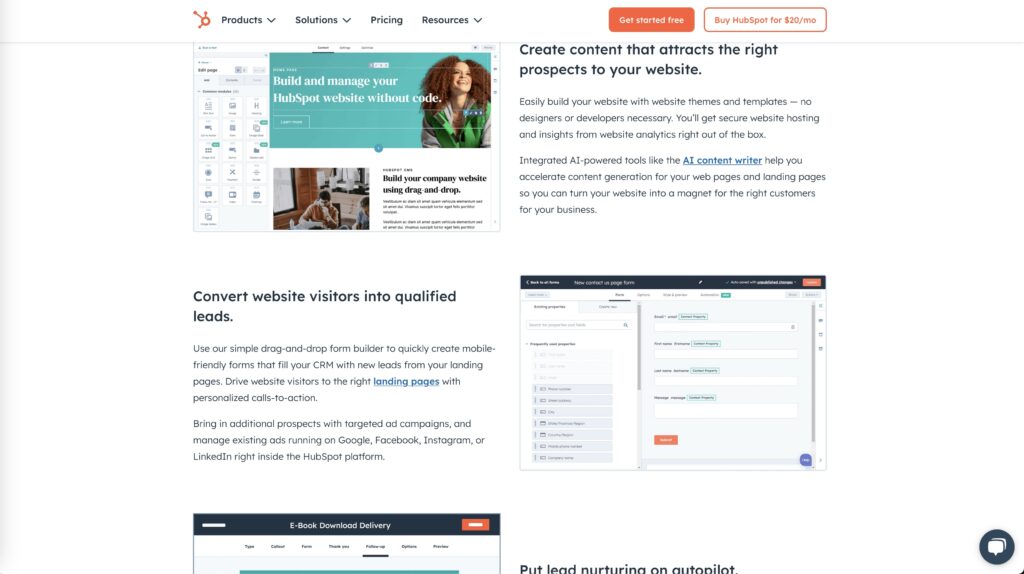
Klaviyo for Startups: Ideal for New Businesses
For startups, choosing the right software can be a make-or-break decision. You need tools that are affordable, easy to use, and capable of delivering quick results. Klaviyo fits this bill perfectly, especially for new businesses focused on eCommerce and email marketing.
Klaviyo helps startups quickly set up personalized email campaigns, segment customers, and automate tasks, allowing small teams to punch above their weight in terms of marketing output.
Key Features of Klaviyo for Startups
- Pre-Built Templates: Klaviyo comes with a variety of email templates that are easy to customize. This is perfect for startups that may not have an in-house design team.
- Automation Workflows: Automate welcome emails, abandoned cart reminders, and post-purchase follow-ups with just a few clicks.
- Advanced Segmentation: Klaviyo’s segmentation capabilities allow businesses to send the right message to the right audience, based on behaviors like browsing history, previous purchases, and customer activity.
- Real-Time Analytics: Track email performance in real-time, helping you make data-driven decisions to optimize your campaigns.
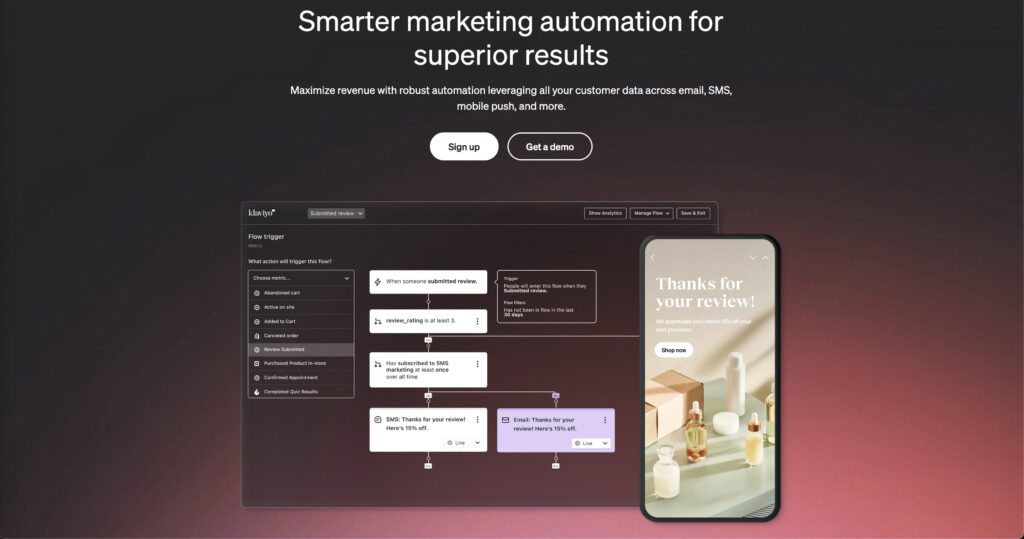
How Klaviyo Supports Early Growth
One of the biggest advantages of Klaviyo for startups is its ability to help businesses grow quickly through targeted email marketing. Personalization is key for startups, as it allows them to build deeper connections with their audience. Klaviyo’s ability to gather customer data and leverage it for precise targeting is invaluable for small businesses looking to maximize every interaction.
For example, a new fitness brand selling athletic wear can use Klaviyo to track customer activity and create tailored product recommendations based on each customer’s browsing and purchase history. This kind of personalized outreach builds trust and increases the likelihood of repeat purchases—a critical factor for early growth.
Klaviyo’s Pricing for Startups
Klaviyo offers a pricing model that’s affordable for startups, with free plans available for businesses with up to 250 contacts. As your contact list grows, pricing starts at $20 per month for 500 contacts and scales as your business expands.
Klaviyo’s pricing is straightforward and predictable, which is ideal for new businesses trying to manage costs while expanding their reach.
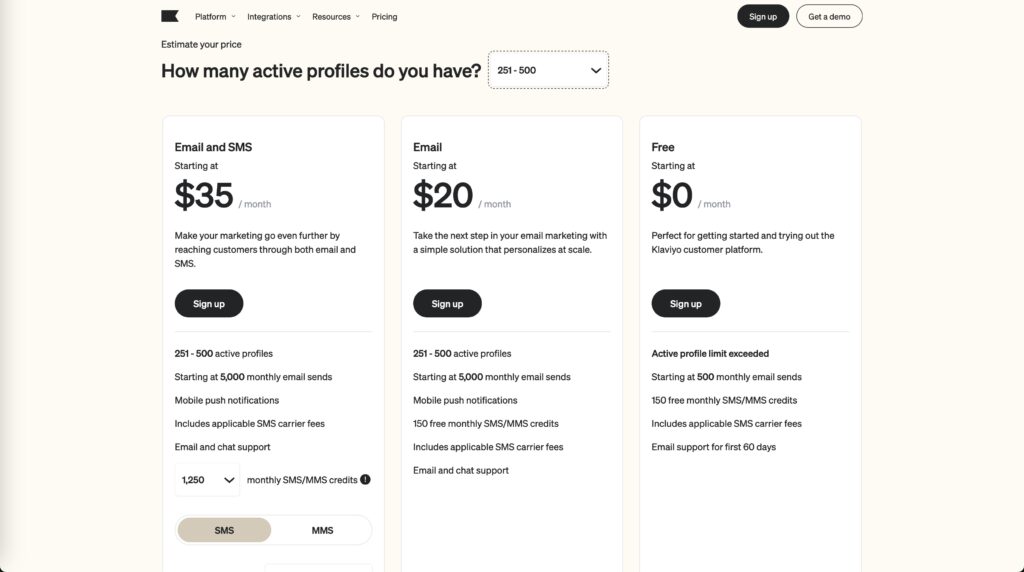
HubSpot for Growing Businesses: A Comprehensive Solution
As your business grows, you’ll likely need more than just email marketing to manage customer relationships and internal processes. HubSpot is designed for businesses that are scaling and need an all-in-one platform that can handle marketing, sales, and customer service.
HubSpot’s CRM is at the core of its platform, allowing businesses to track leads, nurture prospects, and manage customer interactions across multiple channels.
Key Features of HubSpot for Scaling Companies
- Marketing Automation: HubSpot offers sophisticated marketing automation that integrates email, social media, and other channels to create cohesive campaigns.
- Lead Nurturing: With HubSpot, you can nurture leads at every stage of the funnel, from cold prospects to highly engaged customers, ensuring that no opportunity is lost.
- Sales Pipeline Management: HubSpot allows you to track deals, manage sales pipelines, and automate follow-ups, making it easy to streamline your sales process as you grow.
- Customer Support Tools: As businesses scale, managing customer support becomes critical. HubSpot includes a suite of customer service tools, including ticketing, live chat, and knowledge bases, to ensure that you can offer top-tier service.
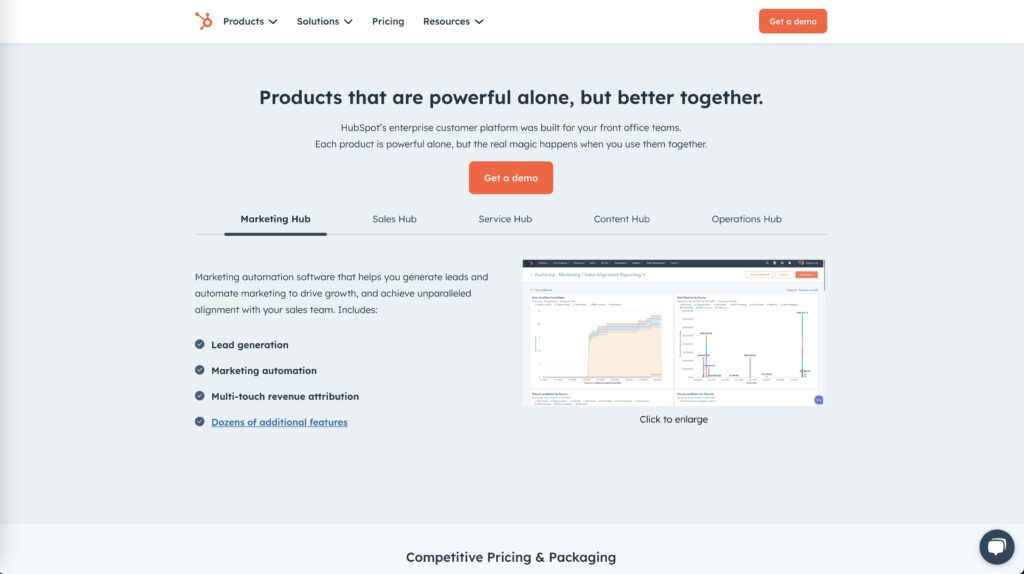
HubSpot’s CRM vs Klaviyo’s CRM
While Klaviyo focuses heavily on email marketing, its CRM capabilities are more limited. It’s primarily built for customer segmentation and email list management, whereas HubSpot offers a full-fledged CRM that integrates deeply with sales, marketing, and service operations.
For businesses looking to grow beyond email marketing, HubSpot’s CRM provides a complete picture of customer interactions, from initial contact to post-sale support. This level of insight helps businesses scale more effectively and manage more complex workflows as they grow.
HubSpot’s Pricing and Flexibility
HubSpot offers a free CRM that’s perfect for small businesses or startups that want to manage basic customer relationships without any upfront costs. However, as businesses grow and need more advanced features like marketing automation, lead scoring, and sales pipeline management, HubSpot’s pricing can become more complex.
- Free Version: HubSpot’s free CRM includes basic email marketing, contact management, and pipeline tracking tools.
- Paid Plans: Pricing for paid plans starts at $15/month/seat and scales based on the features and number of users you need. HubSpot’s modular pricing makes it easy to add features as your business grows.
For businesses that require advanced marketing and sales automation tools, HubSpot offers great flexibility, allowing you to only pay for the features you need.
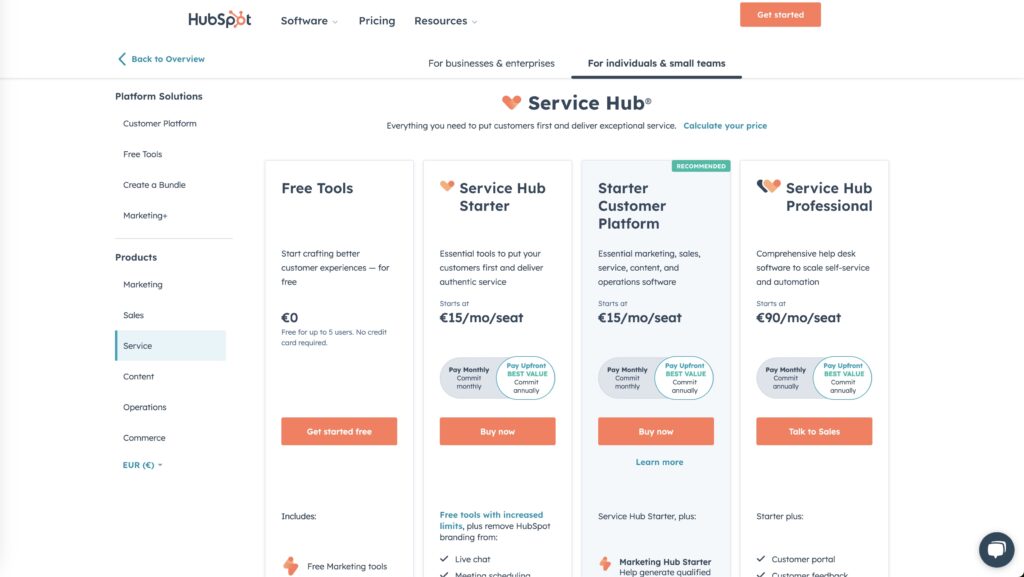
Klaviyo vs HubSpot: Which is Best for Fully Operational Enterprises?
For fully operational businesses, the needs are more complex. Managing large-scale customer relationships, marketing efforts, and service operations requires advanced tools and the ability to scale. HubSpot vs Klaviyo both serve large businesses, but their approaches differ.
HubSpot’s Enterprise-Level Solutions
HubSpot excels in large organizations that need to manage multiple teams, complex sales processes, and extensive marketing campaigns. Its enterprise-level features include:
- Customizable Workflows: Automate complex, multi-step processes that span marketing, sales, and customer service.
- Advanced Reporting and Analytics: HubSpot’s reporting features allow you to create custom dashboards, providing insights across multiple departments.
- Enterprise Support: HubSpot offers dedicated account managers and premium support for larger clients, ensuring that businesses receive the help they need as they scale.
For companies that manage thousands of customers and require a unified platform for marketing, sales, and service, HubSpot’s enterprise solution is one of the most comprehensive in the industry.
Klaviyo vs Hubspot: Role in Large eCommerce Businesses
For large eCommerce businesses, Klaviyo remains a top contender due to its deep integration with platforms like Shopify and BigCommerce. Its focus on email marketing, customer segmentation, and behavioral data makes it invaluable for businesses that rely on precision-targeted campaigns.
For instance, a large online retailer can use Klaviyo’s data-driven segmentation to send highly personalized product recommendations, abandoned cart emails, and post-purchase follow-ups at scale. While HubSpot offers these capabilities, Klaviyo’s specialization in eCommerce gives it an edge for businesses that focus primarily on online sales.
The Klaviyo vs HubSpot: Feature-by-Feature Comparison
Klaviyo vs Hubspot: Ease of Use
- Klaviyo: Known for its user-friendly interface, especially for email marketing. Even businesses with limited technical skills can set up campaigns and workflows quickly.
- HubSpot: While powerful, HubSpot can be overwhelming for new users due to the sheer number of features it offers. However, once users become familiar with the platform, it becomes easier to navigate.
Klaviyo vs Hubspot: Email Marketing
- Klaviyo: The clear winner when it comes to email marketing. Klaviyo’s powerful automation, segmentation, and real-time analytics make it a favorite for eCommerce businesses looking to drive conversions through personalized outreach.
- HubSpot: HubSpot’s email marketing tools are robust, but the platform shines when integrated with other marketing efforts like social media, lead nurturing, and content marketing.
Klaviyo vs Hubspot: CRM Capabilities
- Klaviyo: Primarily an email marketing platform with basic CRM functions.
- HubSpot: A full-fledged CRM that integrates marketing, sales, and service, providing a more holistic view of customer interactions.
Klaviyo vs Hubspot: Pricing Models
- Klaviyo: Pricing starts at $20 per month for 500 contacts, with free plans for up to 250 contacts. Ideal for startups and small businesses with growing email lists.
- HubSpot: Free CRM for basic needs, with paid plans starting at $15 per month/seat. Pricing scales based on features and user count, making it more flexible for growing businesses.
Klaviyo vs Hubspot: Integrations
- Klaviyo: Integrates seamlessly with eCommerce platforms like Shopify, BigCommerce, and WooCommerce.
- HubSpot: Integrates with over 500 apps, including Salesforce, Slack, and WordPress. HubSpot’s extensive integration capabilities make it ideal for businesses that use multiple tools.
Klaviyo vs Hubspot: Support and Training
- Klaviyo: Provides basic support via email and knowledge base, though it lacks the extensive training resources found in HubSpot.
- HubSpot: Offers HubSpot Academy, a comprehensive resource for learning how to use the platform. HubSpot’s 24/7 support for premium plans also ensures that businesses get the help they need.
3 Alternatives to Klaviyo and HubSpot
If neither Klaviyo nor HubSpot fits your business, here are three strong alternatives:
1. ActiveCampaign
ActiveCampaign combines email marketing with CRM features, making it a solid choice for businesses that want both. It offers automation, segmentation, and lead management in one platform.
- Best for: Small to mid-sized businesses needing both email marketing and CRM capabilities.
- Pricing: Starts at $29/month.
2. Mailchimp
Mailchimp is another popular email marketing platform known for its simplicity. While it doesn’t have robust CRM capabilities, it’s perfect for businesses that primarily need email marketing.
- Best for: Small businesses and startups focused on email marketing.
- Pricing: Free for basic features, with paid plans starting at $9.99/month.
3. Salesforce
For large enterprises with complex needs, Salesforce is the gold standard in CRM. It offers extensive customization and advanced automation, but it can be costly and require a steeper learning curve.
- Best for: Large enterprises with deep CRM requirements.
- Pricing: Starting at $25/user per month.
Final Verdict: Klaviyo vs HubSpot – Which Is Best for Your Business?
Choosing between Klaviyo vs HubSpot depends on your business’s stage and specific needs:
- Klaviyo is the ideal choice for startups and eCommerce businesses focused on email marketing and customer segmentation. Its affordability and ease of use make it perfect for growing businesses.
- HubSpot is better for businesses that need a comprehensive CRM solution. Its ability to manage marketing, sales, and service in one platform makes it invaluable for companies that are scaling and need more robust tools.
Ultimately, the right choice is the platform that aligns with your business goals and growth trajectory. Both Klaviyo vs HubSpot offer powerful solutions, but the best one for you will depend on your immediate needs and long-term vision.

